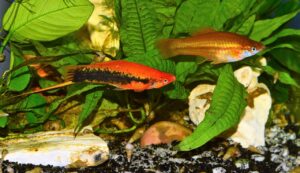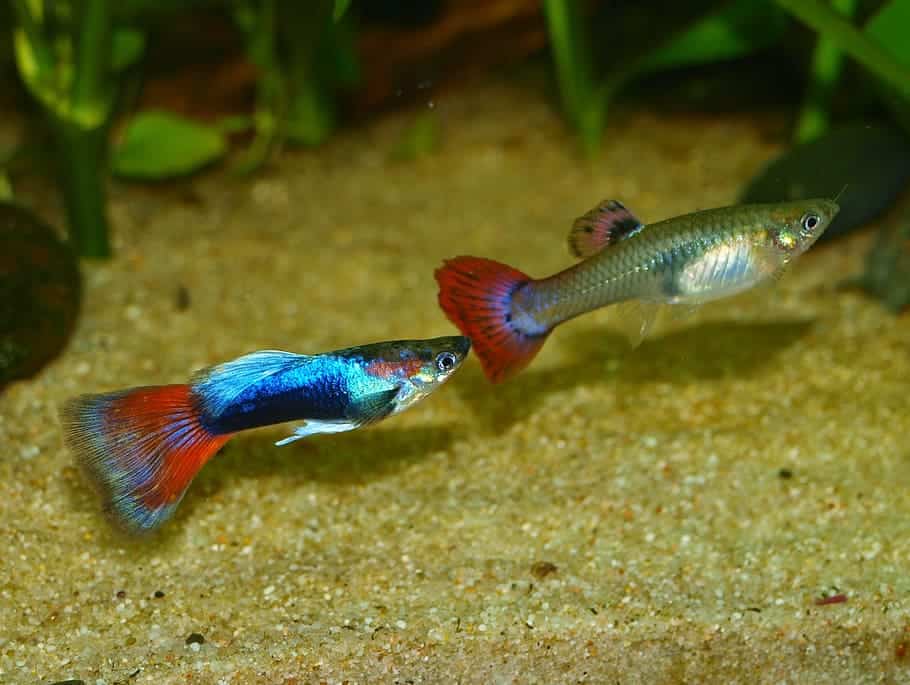What are livebearer fish? In the fish world, these are fish that give birth to live young, rather than the eggs most others stick to. The two most common species of livebearer fish in the pet world are guppies, mollies, platys and swordtails. The biggest issue when keeping these fish is that it only takes one pregnant fish to quickly overwhelm your system. Learn more about how best to keep livebearer fish so they can stay happy and healthy in your home aquarium.
What does “livebearer” mean?
Livebearer fish give birth to live young. Unlike other pet fish species, such as goldfish and koi, who utilize external fertilization and lay clutches of eggs in their environment, livebearer fish rely on internal fertilization, where baby fry grow inside of mom and come out as fully formed fish. This is why you may think you are bringing home one overly-conditioned (aka “a little chubby”) fish, when, in fact, it is a pregnant fish, ready to give birth.
For guppies, gestation is only 20-30 days, swordtails will take closer to 30 days, platies will take 25-35 days and mollies will gestate for up to 60 days. Either way, your system can quickly become overwhelmed with multiple generations within a few months. It is always best to separate boys and girls in order to eliminate unwanted generations.
The Most Common Livebearer Fishes
In the pet fish world, there are a few common types of livebearer fish: mollies, guppies, platys and swordtails.
Mollies (Poecilia latipinna)
Mollies are typically larger than guppies with a relatively large body compared to their tail. Typical mollies will have a round body with a rounded tail tip, whereas “lyretail” mollies have the same body shape with pointed tail tips. They come in a wide variety of colors and are excellent beginner fishes, readily consuming most commercial tropical diets and requiring a 20-30 gallon tank for a school. Being a livebearing fish, it is critical to be able to identify your males and females in order to keep them from reproducing too rapidly. Males will have a pointed anal fin with a larger dorsal fin, whereas females will have a rounded anal fin.
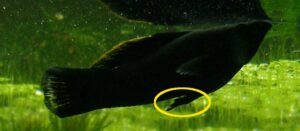
Guppies (Poecilia reticulata)
Another member of the Poeciliidae family, guppies tend to be smaller than mollies and have a long body and tail. Their colors can vary greatly and come in a variety of brilliant shades and patterns. Be aware of “designer” breeds that often occur due to reckless inbreeding. Stick to well known varieties, such as cobras and tuxedos. Like the mollies, it is important to know your males vs. females. Males have a prevalent gonopodium on their anal fin, causing it to resemble a stick, and females will have a fan-shaped anal fin. They are easy to keep and are also great beginner fish.
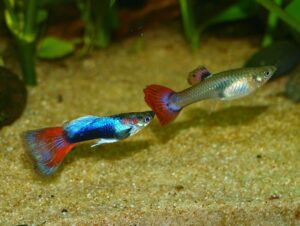
Platies (Xiphophorus maculatus)
The Platy can look very similar to a Molly, but typically has shorter rounder bodies. Mollies have cute little underbites whereas platies will have a front-facing jaw. Like their above cousins, platy males will have a pointed anal fin whereas females will have a wider, fan-shaped anal fin. They are also called “moonfish” in some circles.
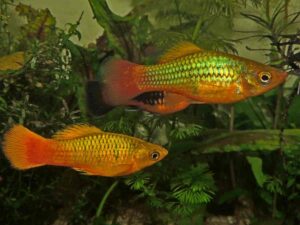
Swordtails (Xiphophorus hellerii)
Given their name, Swordtail fish are noted for their elongated ventral tail fin, but only in the males. This makes it very easy to tell the boys from the girls, but can be tricky to tell girls from other species. They are just as easy going as all the fish above and also come in a wide variety of colors. There is another variety of swordtails that also have an elongated dorsal fin, known as “hi fins,” and “lyretails” similar to mollies.
